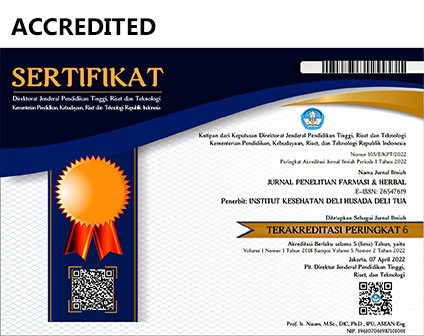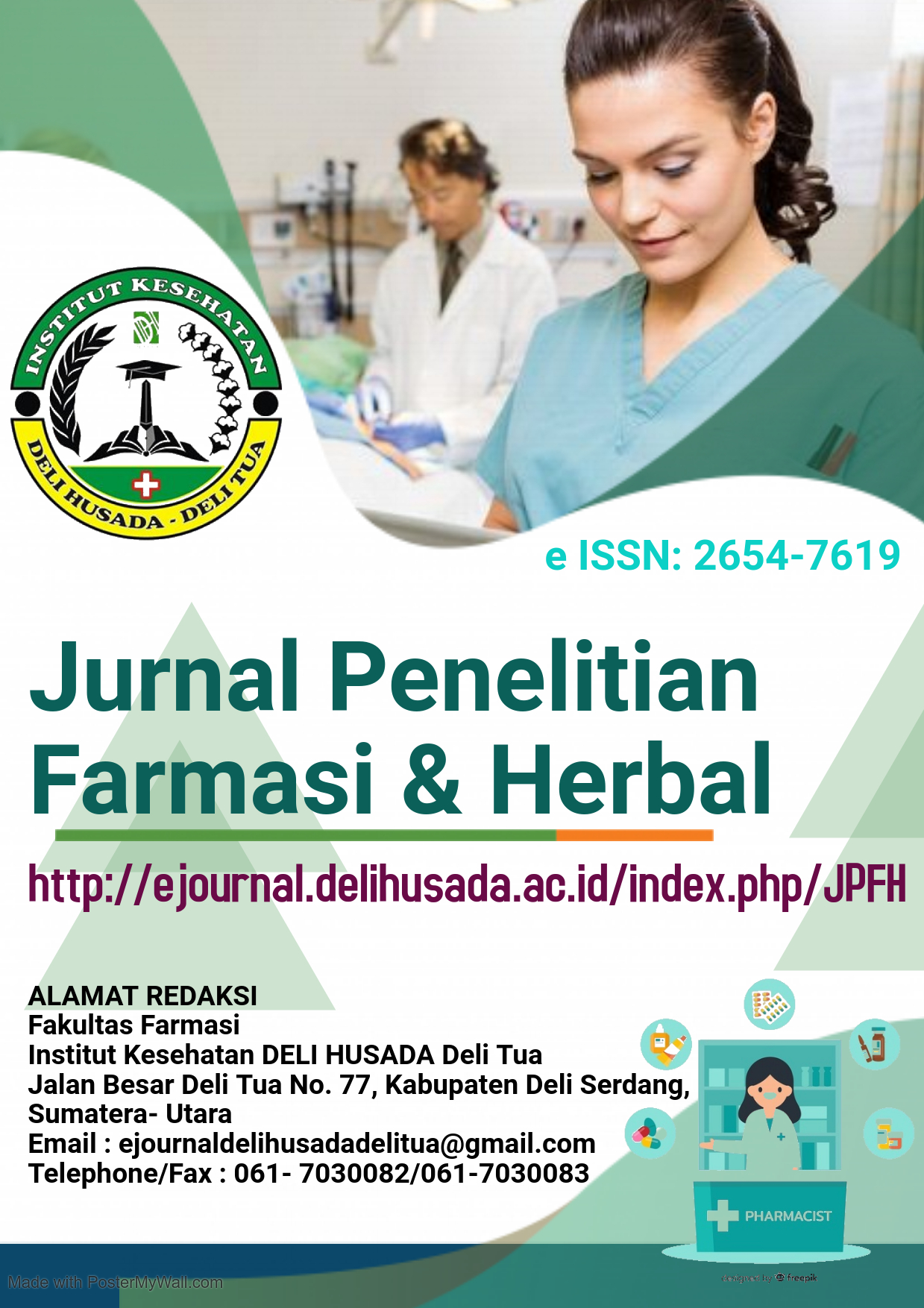A ntihypercholesterolemia UJI EFEKTIVITAS ANTIHIPERKOLESTEROLEMIA EKSTRAK DAUN KOPI ARABIKA (Coffea arabica L.) PADA TIKUS PUTIH JANTAN (Rattus norvegicus) YANG DIINDUKSI DIET TINGGI LEMAK
The ARABICA COFFEE (Coffea arabica L.) LEAF EXTRACTS IN MALE WHITE RATS (Rattus norvegicus) INDUCED ON A HIGH FAT DIET
Abstract
Hypercholesterolemia is a condition that cholesterol in the blood increases beyond the normal which is one of the risk factors for cardiovascular disease. Arabica coffee leaves are part of the arabica coffee plant which contains flavonoid, saponin, mangiferin, chlorogenic acid which are thought to reduce cholesterol levels in the blood. This study aims to determine the antihypercholesterolemia effectiveness of arabica coffee leaves ethanol extract (ACLEE) in male rats induced by a high-fat diet. The test of antihypercholesterolemia effectiveness used male rats induced by a high-fat diet as test animals. The study used 25 rats and divided into 5 groups : negative control (CMC-Na 0.5%), positive control (simvastatin 0.9 mg/kgBW), ACLEE 200 mg/kgBW, ACLEE 300 mg/kgBW and ACLEE 400 mg/kgBW. Total cholesterol were measured by the CHOD-PAP method. The data obtained were analyzed statistically used one way Anova. The results of statistical analysis showed that there was a significant difference between negative control with positive control, ACLEE 200, 300 and 400 mg/kgBW (p-value<0.05). The decrease in total cholesterol levels increased in line with the increase in the dose of arabica coffee leaves ethanol extract. The most effective of ACLEE as antihypercholesterolemia was ACLEE 400 mg/kgBW. There was no significant difference between positive control and ACLEE 400 mg/kgBW (p.>0.05). Based on the results of statistical analysis, it can be concluded that the arabica coffee leaves ethanol extract has antihypercholesterolemic effect in rats.
Downloads
References
Harini M, Astirin OP. 2009. Blood cholesterol levels of hypercholesterolemic rat. (Rattus norvegicus) after VCO treatment. Nusantara Bioscience 1: 53-58.
Kiattisin et al., 2019. Anti-inflammatory, Antioxidant Activities and Safety of Coffea arabica Leaf Extract for Alternative Cosmetic Ingredient. Chiang Mai Journal of Science, 46(2), 284-294.
National Cancer Institute. 2011. Depression.http://www.cancer.gov/cancertopics/pdq/supportivecare/ depression/Patient /page2/AllPages.
Raoof, G.F.A., Khaled, Y.M., dan Hala, M.M. 2017. Phytochemical Evaluation, Anti-obesity and Antihyperlipidemic Effects of Combined Administration of Green Coffee, Cinnamon and Ginger. Science Publishing Group, 5(5), 80-84.
Riset Kesehatan Dasar (Rikesdas). 2018. Badan Penelitian dan Pengembangan Kesehatan. Kementerian Kesehatan RI.
Romadhoni, D. A., Murwani, S., dan Oktavianie, D. A. 2014. Efek Pemberian Ekstrak Air Daun Kelor (Moringa oleifera Lam.) Terhadap Kadar LDL dan HDL Serum Tikus Putih (Rattus norvegicus) Strain Wistar yang Diberi Diet Aterogenik. Thesis. FKH Universitas Brawijaya, Malang.
Saragih, Bernatal. 2017. Kolesterol dan Usaha-usaha Penurunannya. Yogyakarta : Bimotry.
Susyani, Zurio, A. dan Terati. 2020. The Bay Leaves Tea Can Decrease Cholesterol Levels of Patients With Cardiovascular Disease. World Journal of Advance Healthcare Research, 4(3), 173-177.
Utama, R.D. 2021. Kolesterol dan Penanganannya. Kediri : Strada Press.
Zeka, K., Ruparelia, K., Arroo, R. R. J., Budriesi, R. dan Micucci, M. 2017. Flavonoids and Their Metabolities : Prevention in Cardiovascular Diseases and Diabetes. MDPI diseases, 5(3) : 19.







